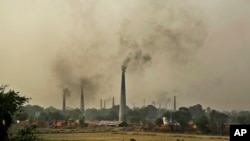Air pollution is the biggest environmental health risk in the world, says the World Health Organization.
Part of the problem is particulate matter -- very small particles floating in the air. Particulate matter, also known as PM, may get trapped in the lungs. Scientists have long known about the harmful effects of breathing PM. The particulates are linked to an increased risk of breathing problems, heart attacks, strokes and lung cancer.
In 2005, the World Health Organization proposed air quality guidelines and limits for some air pollutants that raise health risks. Its guidance showed that by reducing PM levels from 70 to 20 micrograms per cubic meter, we can cut air pollution-related deaths by 15 percent.
A U.S.-based team has been studying the issue. Its members are environmental engineers and public health researchers. The team recently prepared a model to show how much people would be helped if air pollution from PM is cut to the WHO’s suggested limits.
Joshua Apte is an assistant professor of environmental engineering at the University of Texas, Austin. He led the study.
“About 75 percent of the total number of deaths that could be avoided from cleaner air could come from improving air in some of the most polluted parts of the world, like India and China.”
He adds that improving air quality could bring as many health benefits as when we take steps to deal with major diseases like malaria or AIDS.
The study estimates that reducing air pollution around the world could save 1.4 million people in places like India and China. But that is not an easy goal.
The report says that even to reduce mortality rates in half, India and China would need to cut pollution levels by almost 70 percent from their 2010 levels.
In places like New Delhi, PM levels are sometimes 10 times higher than the amount set in the WHO’s air quality guidelines.
India and China are home to some of the world’s most polluted cities. Thirteen of the world’s 20 most polluted cities are in India. The capital, New Delhi, is at the top of the list.
The study also shows that even if the pollution levels stay the same, death rates would jump by over 20 percent in India and China.
Joshua Apte explains that the main reason for this increase is population changes in these countries over time. He notes that as the population gets older over time, the number of people at risk of heart attack or stroke goes up.
But it may be difficult for India and China to improve air quality since both countries still use coal for electricity. Many roads are becoming filled with vehicles owned by the growing middle class.
China has done some work in cleaning the air. But experts believe that air pollution could worsen in India. They worry that India wants to increase the number of coal-powered plants to fuel the country’s economy.
About 100 scientists and academics recently met in New Delhi. The Indian Association for Air Pollution Control organized the gathering. The delegates expressed regret that Indian officials have taken little action to limit air pollution.
P.K. Dave is an air quality expert. He called for a public campaign to deal with air pollution from industry and traffic.
The latest research shows that countries with cleaner air could also receive help from improving air quality.
Researchers found that places with cleaner air, such as North America and Europe, could save up to 500,000 people a year if they met the WHO’s air quality guidelines.
I’m Anna Matteo.
Anjana Pasricha reported on this story from New Delhi. Triwik Kurniasari adapted it for Learning English. George Grow was the editor.
_______________________________________________________________
Words in This Story
premature deaths – n. deaths that happen earlier than the expected age
benefits – n. good results
mortality – n. the percentage of people dying; the rate of deaths
power plant(s) – n. a buildings in which electricity is produced; a factory
curb – v. to control, limit






